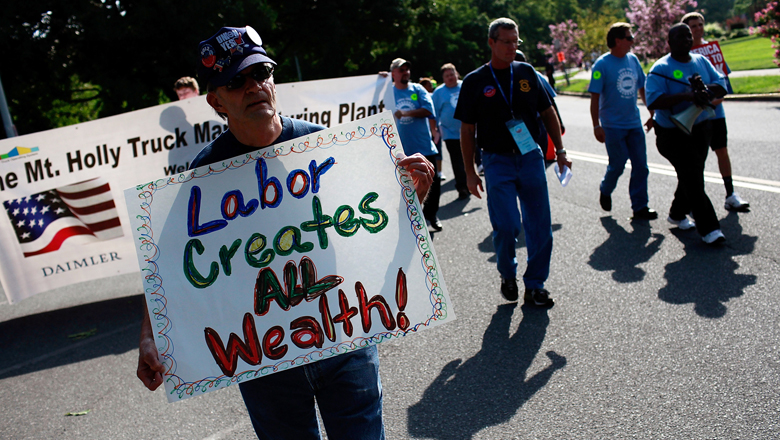
The United States and Canada celebrate Labor Day on the first Monday of September, unlike the majority of the world which celebrates workers on May 1. Why is this?
In 1889 an international federation of socialist groups and trade unions designated May 1 as a day in support of workers, in commemoration of the Haymarket Riot in Chicago (1886). Five years later, U.S. Pres. Grover Cleveland, uneasy with the socialist origins of Workers’ Day, signed legislation to make Labor Day—already held in some states on the first Monday of September—the official U.S. holiday in honour of workers. Canada followed suit not long afterward.
On May 1-3, 1886, about 250,000 factory workers in Chicago took to the streets to protest long working hours with the rallying cry, “Eight-hour day with no cut in pay.” During this time, Chicago was a major industrial center where German and Bohemian immigrant workers were paid about $1.50 a day, or about $36.65 a day adjusted for inflation. These laborers worked 10-hour shifts 6-days a week, according to Working Hours of the World Unite? New International Evidence of Worktime, 1870-1913.
The Federation of Organized Trades and Labor Unions unanimously set May 1, 1886, as a national day of protest for an 8-hour work day. Although it was a peaceful protest, Chicago police fired on the crowd and killed two workers.
The next day a huge rally to protest the police brutality took place at Haymarket Square in Chicago. At just around 10:30 a.m. as a line of police advanced on the rally, someone threw a bomb at the officers, killing one and wounding 6 more. Police open fired, killing four demonstrators and injuring dozens more.
May Day become a holiday the following year to remember the victims who died while protesting for fair and humane working conditions.
Following the 1886 incident, May Day became an international holiday celebrated by workers and radicals across the world. May Day held particular significance in socialist countries like the Soviet Union and, after 1959, Cuba, who commemorated the day with large parades.
Between April and June of 1919, bombs were sent by radical anarchists to important industrial and elected officials across the country. The event is called the Red Scare of 1919–20, and was spurred by the October Revolution by the Bolsheviks in Russia. According to the Chicago Daily Tribune, at least 36 explosive packages, planned to go off around May Day, were sent to the governors of Pennsylvania, and Mississippi, congressmen and senators from Utah, North Carolina, Washington, Georgia, Pennsylvania, and Alabama, as well as John D. Rockefeller and J.P Morgan Jr. Only 12 were ultimately recovered.
Many of the bombs, including the one which exploded on Attorney General A. Mitchell Palmer’s front porch, found their targets. Palmer wasn’t killed but his neighbors, future president Franklin Delano Roosevelt and his wife Eleanor, barely avoided the blast.
The May Day anarchist bombings were followed a month later by more bombings in June.
All the bombings were coordinated by Luigi Galleani, an Italian anarchist active in the United States, and his followers, “Galleanists.” The bombings led to the Palmer raids where Galleani and many of his followers were arrested and deported.
In 1921, at a time when the U.S. government was most afraid of violent working-class uprisings spearheaded by foreign radicals, the U.S. government declared May 1 “Loyalty Day.” The holiday did not become an official U.S. holiday until the second red scare when Dwight Eisenhower proclaimed that May 1, 1959, would be the first official Loyalty Day.
According to the legislation:
Loyalty Day is a special day for the reaffirmation of loyalty to the United States and for the recognition of the heritage of American freedom.
Earlier this year, President Trump reminded his followers about Loyalty Day at a 2020 campaign rally celebrating his 100th day in office in Harrisburg, Pennsylvania.
Trump also touched on his lack of legislative achievement, where he blamed the American Constituion for its checks and balances of exectuive power, according to The Guardian. “It’s a very rough system. It’s an archaic system… It’s really a bad thing for the country,” Trump said.